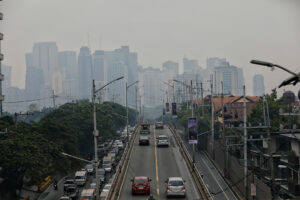




January Economic Update: Growth slows, prices rise
 DOWNLOAD
DOWNLOAD

Inflation Update: Up, up, and away?
 DOWNLOAD
DOWNLOAD

Quarterly Economic Growth Release: Growth takes on a slower pace
 DOWNLOAD
DOWNLOAD


PH economy seen to grow by 5.6% in 2024

The Philippine economy is expected to be the second fastest-growing economy in Southeast Asia in 2024, according to the Mastercard Economics Institute (MEI).
In its latest “Economic Outlook: Balancing Prices & Priorities” report, MEI gave a Philippine gross domestic product (GDP) growth forecast of 5.6% for 2024.
This would make the Philippines the second fastest-growing economy in Southeast Asia, just behind Vietnam which is projected to grow by 6.2%.
MEI data showed Philippine GDP will likely expand faster than Indonesia’s 5.1%, Malaysia’s 4.5%, and Thailand’s 3.4%.
Philippine economic managers are targeting 6.5-8% GDP growth next year.
MEI said the Asia-Pacific region is likely to see a modest GDP growth acceleration, although below trend, in 2024.
“While MEI believes that the global economy will feel more ‘normal’ in 2024 than the prior three years, it is still an economy in the process of rebalancing. This means consumers and corporations will be mindful of how to prioritize their spending and investment in an environment of shifting relative price differentials and higher borrowing costs,” it added.
MEI cited several global risks that could impact the region’s growth next year, such as geopolitical tensions, persistent inflation, threats to financial stability, uncertainty in China, and climate disasters.
Meanwhile, MEI projected Philippine inflation to average 5.7% next year, well above the Bangko Sentral ng Pilipinas’ (BSP) forecast of 3.7%.
MEI’s inflation outlook for the Philippines is the highest in Southeast Asia, ahead of Vietnam (3.2%), Indonesia (3%), Malaysia (2.4%), and Thailand (1.8%).
The Philippines continued to experience elevated inflation this year, as food and transport costs rose.
However, inflation eased for a second straight month to 4.1% in November. It marked the 20th straight month that inflation was above the central bank’s 2-4% target.
In the first 11 months, inflation averaged 6.2%, faster than 5.6% in the same period a year ago but above the BSP’s full-year baseline forecast of 6%.
As inflation eases, MEI said the Philippine central bank will likely cut policy rates to 6% next year.
“Central banks are likely at or close to peak rates. MEI expects some easing in 2024 as inflation cools while growth remains subdued. This could prompt a partial ‘normalization’ of monetary policy,” it said.
The BSP kept the benchmark rate at a 16-year high 6.5% in its latest November meeting. The central bank has raised rates by 450 basis points since May 2022.
The Monetary Board is set to have its last meeting this year on Thursday (Dec. 14).
BSP Governor Eli M. Remolona, Jr. last week said it is premature to discuss easing in 2024 until inflation stays within the 2-4% target. — Luisa Maria Jacinta C. Jocson
This article originally appeared on bworldonline.com





 By BusinessWorld
By BusinessWorld